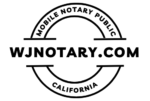Temecula Valley Mobile Notary Public
Mobile Notary Appointments!
Schedule a mobile notary visit at your preferred location – whether it’s your home, office, retail space, or a public spot.
Book your same-day appointment online and get instant email confirmation.
Licensed, bonded, background checked, available same-day. $15 per signature + $50 travel fee
For urgent requests, please email or text us.
(951) 223 – 6996


We notarize:
- Loan Document Notarization (including Mortgages, Refinances, HELOCs, and other related financial documents)
- Trust Document Notarization
- Deed Notarization (e.g., Grant Deeds, Quitclaim Deeds, Interspousal Transfer Deeds)
- Power of Attorney Notarization (General, Special, Healthcare, Financial)
- Divorce Document Notarization (e.g., Marital Settlement Agreements)
- Financial Document Notarization (beyond loans, e.g., affidavits of financial support)
- Contract Notarization (e.g., business agreements, personal contracts)
- Minor Travel Consent Form Notarization
- Certain Insurance Documents Notarization
- Adoption Documents Notarization
- Real Estate Document Notarization (broad category covering various property-related documents)
- Acknowledgment Notarization
- Jurat Notarization including oath/affirmation)
- Personal & Family Legal Documents: Living Trust/Estate Planning Documents, Pre- and Post-Nuptial Agreements, Child Custody Agreements, Advance Health Care Directives, Temporary Guardianship Affidavits, Passport Consent Form for Minors, Marital Status Affidavits
- Real Estate & Property Records: Deeds – Grant, Deed of Trust, Quit Claim, Warranty, Real Estate Documents, Substitution of Trustee Documents, Liens – Waivers and Releases, Trust and Interspousal Transfer Deeds, Occupancy Statement/Affidavits, Certification of Trust Documents
- Financial & Business Records: Power of Attorney Forms, Unclaimed Property Forms, Retirement Distribution/Rollover Forms, Bill of Sale Forms, Bid Bonds, Non Collusion Affidavits, Errors & Omission Agreements
- Affidavits & Special Certifications: Affidavit of Forgery/Fraud Forms, Signature Affidavit/AKA Statements, Authentication Documents
- Medical & Insurance Records: Insurance Claim Documents, Medical Records/Forms, Death Claim Benefit Forms, Proof of Loss Forms, HIPAA Authorization Forms



